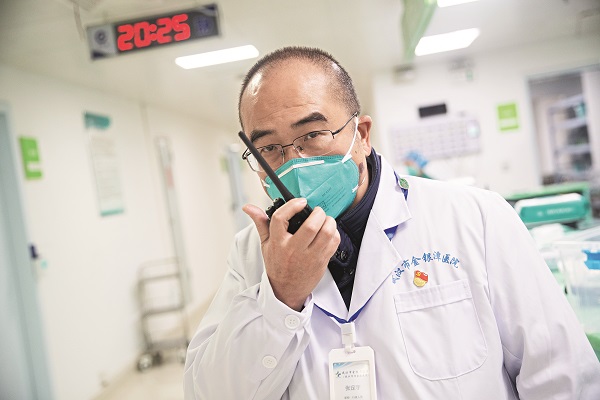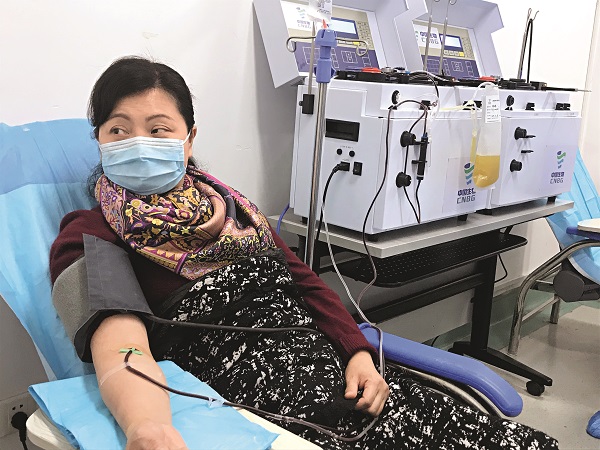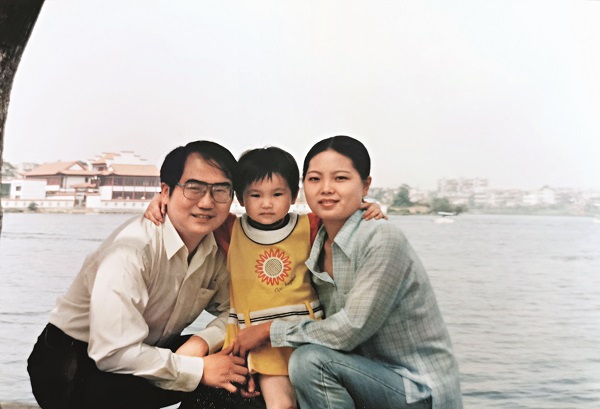Embodying China's Anti-Epidemic Spirit
 |
| Zhang Dingyu arranges the transfer of a critically ill COVID-19 patient. |
Wuhan Jinyintan Hospital was one of the hospitals designated for severe COVID-19 cases in the early period of the outbreak. In the fight against the disease, many Chinese were deeply moved by Zhang Dingyu, then-President of Wuhan Jinyintan Hospital, who was on the "battlefield" fighting the virus.
Zhang, suffering from the debilitating amyotrophic lateral sclerosis (ALS), endured unbearable pain as he worked tirelessly with his "inflexible body." For his determination, he was nicknamed "iron man."
Zhang's wife, Cheng Lin, stood behind the "iron man." Recalled Zhang: "The CPC assigned me to work for the people at this post." Added Cheng: "I will fully support him to whatever end."
'I Must Run Faster'
Zhang was incredibly busy at work, beginning on December 29, 2019. That was the day the hospital received the first group of patients transferred from Hubei Provincial Hospital of Integrated Chinese and Western Medicine. All of the hospital's 21 departments finished preparations for treating the patients, in accordance with the schedule set by Zhang. Despite his physical exhaustion, many of the medical staff said, "Director Zhang is working harder than us!" During that initial period, Zhang's strong voice, and the image of him limping through the hospital, inspired his colleagues to show bravery in the face of the epidemic.
It was only after the hospital began treating COVID-19 patients that many of Zhang's colleagues had learned he had been diagnosed with ALS more than two years earlier. Learning of his medical condition made Zhang's colleagues determined to fight alongside him. That, in turn, inspired Zhang. He said, "I must run faster to save more patients from this disease."
On January 18, 2020, Cheng was diagnosed with COVID-19, and she was hospitalized in Wuhan No. 4 Hospital, where she worked. Zhang was devastated; his sadness was deepened by the fact he could neither visit (initially) nor treat his wife, because he had a duty to the workers and patients at his hospital. Sending Cheng medicine was all Zhang could do. He was finally able to see Cheng late at night on the third day of her hospitalization. Zhang was afraid Cheng wouldn't pull through. He said several times, "We have been married for 28 years, and we love each other deeply. I don't want to lose her!"
Cheng worried about her husband as well. "He is so busy with work. I am afraid of him being infected by me," Cheng said. She added, with a sense of relief, "With his medicine, I will be fine." Zhang stayed with his wife for just 30 minutes, and he cried after he left the isolation ward. It was because of the love and support he had received from Cheng that he had been able to fulfill his dreams, and achieve great success, throughout the years.
 |
| On February 18, 2020, after she has recovered from COVID-19, Cheng Lin donates blood plasma to be used in COVID-19 treatments. |
For example, Zhang was assigned to work in Algeria, with a medical team from Hubei Province, in December 1997. He was 34 that year. Cheng was 28. Their daughter was just three years old. Zhang and Cheng had been married for five years to that point, and Cheng had watched her husband study English every day. She knew he longed for a chance to work abroad. So, she tried to be supportive. The couple wrote more than 120 letters to each other during the two years Zhang worked in Algeria. "When I felt lonely, I read his letters over and over again," Cheng recalls.
 |
| Zhang Dingyu poses for a photo with his wife and daughter before he leaves for Algeria (photo taken in 1997). |
Heal Patients, Regardless of Physical Weakness
On May 12, 2008, Wenchuan, in Southwest China's Sichuan Province, was ravaged by a magnitude-8 earthquake. Zhang headed the third medical team dispatched to Wenchuan from Hubei Province.
From late 2010 to early 2011, Zhang worked in Pakistan, with Médecins Sans Frontières (Doctors Without Borders), during a three-month, international-rescue mission. Cheng supported Zhang's decision to go. "I will take care of everything at home," she told him.
In 2017, Zhang noticed something was wrong with his legs. He was diagnosed with ALS in October 2018. At first, he was frightened and depressed. But he comforted himself by saying, "I am a Party member. Even if my body becomes weak, I will still have my firm beliefs."
On September 8, 2020, an award ceremony was held in the Great Hall of the People, in Beijing, to honor role models and groups for their contributions in the fight against the COVID-19 epidemic. Xi Jinping, General Secretary of the CPC Central Committee, presented the People's Hero award to Zhang. Xi asked Zhang about his physical condition. Zhang answered, "I am fine!"
In late September 2020, Zhang attended the opening ceremony for freshmen at Huazhong University of Science and Technology, from which he had graduated. He told the young students, "I hope to heal patients, regardless of my physical weakness." Cheng remains by Zhang's side, observing his deteriorating physical condition and monitoring carefully his body's subtle physical changes.
Photos Supplied by Zhang Dingyu
(Women of China English Monthly July 2021 issue)
Please understand that womenofchina.cn,a non-profit, information-communication website, cannot reach every writer before using articles and images. For copyright issues, please contact us by emailing: website@womenofchina.cn. The articles published and opinions expressed on this website represent the opinions of writers and are not necessarily shared by womenofchina.cn.

 京公网安备 11010102004314号
京公网安备 11010102004314号